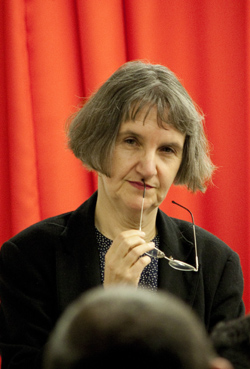
A little while back, on November 23, ECLA of Bard hosted the NY-based artist Zoe Beloff. The artist talk disclosed the working process behind two of Zoe Beloff’s recent pieces – The Coney Island Amateur Psychoanalytic Society and Days of the Commune.
The Coney Island Amateur Psychoanalytic Society project started from the invitation made to Zoe by the Coney Island Museum’s director Aaron Beebe to commemorate the centennial of Sigmund Freud’s visit to Coney Island. While doing her research to develop a concept for this occasion, Zoe learned of an intriguing society founded by Albert Gross, which embodied Freudian psychoanalytical principles.
The community was called The Coney Island Amateur Psychoanalytic Society and its members were invested in understanding the life of the mind. They were making amateur movies whose content aimed to reproduce their own dreams. In this way, they intended to faithfully illustrate and analyze their own psychic data.
Very quickly Zoe confesses that she is maybe the only member of the Society. In fact, Albert Gross functions as Zoe’s foil. Through him, Zoe constructs from scratch the mythical society, or the “urban myth” as she puts it, whose members were working class people and admirers of Freudian psychoanalysis. The Coney Island Amateur Psychoanalytic Society thought of psychoanalysis like they thought of socialism: just as socialism aimed to change people’s exterior lives and working conditions, psychoanalysis was seen, in a utopian spirit, as a way of liberating oneself from one’s conventional setting.
For Zoe, Gross’ mission was to create a space for psychoanalysis within the collective imagination. Gross had an ambition to build the Coney Island amusement park. The park would consist of a series of pavilions – “The Unconscious,” “The Psychic Censor,” “The Dream Work Factory,” and “The Consciousness” – all connected and revolving around “the Libido.” In this park, people would amuse themselves by analyzing their unconscious.
Zoe is a collector of home made movies; she thinks of them as Freud thought of jokes and slips of the tongue, as revealing the anxieties of everyday life. The movies collected by Zoe through the years could be fittingly incorporated in The Coney Island Amateur Psychoanalytic Society project, and they were! These videos were edited amateurishly and presented as if the members of the Society had made them in the attempt to explore the mind – this internal space where utopia presents itself as possible.
Zoe’s second project presented during the evening was Days of the Commune. Although the creative process and the media that were being used were different, the artwork still obeyed the same logic as the first one did. Like Zoe explained in her talk: “Each project aims to connect the present to the past so that it might illuminate the future in new ways.”
Even before the Occupy movement took place, Zoe was asking herself: “Where is the radical left when we need it?”. She did not expect to find the answer right on her doorstep. When the Occupy movement started, it was not clear for Zoe how she will be a part of it, but nevertheless she wanted to hang out and spend time with the protesters. Her first reaction to this very politically charged circumstance was to do some documentary drawings as a way of interacting with the Occupy members, and as a way to listen and pay attention to what was going on. While she was drawing, it occurred to her how important the drawings made by Courbet and Monet in 1871 to depict the Paris Commune were.
Going back to this particular event – the Paris Commune – Zoe realized that this was actually the first great historical Occupy movement that ever took place. She thought, “here too, we’re dealing with working people who took over their own city and started a radical democratic government for themselves.” To her, it was clear that the similarities emerging between the Paris Commune and the Occupy movement deserved a more focused discussion.
Knowing that Bertolt Brecht had written a play “Days of the Commune” which treats the rise and fall of the Paris Commune of 1871, Zoe was convinced that the play could teach us something about the Occupy movement. Not only did the egalitarian nature of the Paris Commune speak of the similarities with the Occupy movement, but it could also illuminate in many ways the present political conditions. This brought about a sense of urgency to make Brecht’s play happen where the Occupy movement was organizing itself in the streets. The street was an ideal public space for socially engaged theatre. To make her project come true, Zoe sponsored it with the money she earns from her teaching position.
By the end of Zoe’s presentation, the questions coming from the ECLA of Bard community were numerous. The members of the audience were interested in further aspects of Zoe’s art and in understanding the apparent contradictions that characterize her works.
